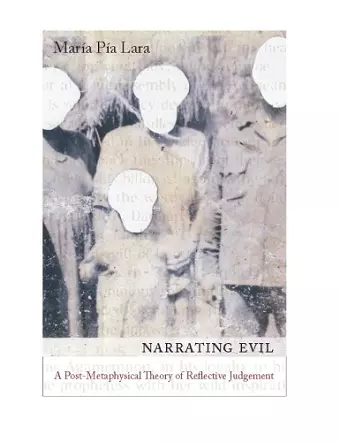Narrating Evil
A Postmetaphysical Theory of Reflective Judgment
Format:Hardback
Publisher:Columbia University Press
Published:11th May '07
Currently unavailable, and unfortunately no date known when it will be back

Narrating Evil is certain to make important contributions not only to the current literature on evil but also to the literature on reflective judgment, on Arendt, and on narrative, trauma, and collective memory. -- Amy R. Allen, Dartmouth College One cannot imagine a more timely project. At a moment when it is perhaps clearer to us than ever before that torture, genocide, terrorism, and war are just not going to go away, it is of absolute urgency that moral and political theorists wrestle again with the whole question of political evil. With the Habermasian, Arendtian, and feminist intellectual resources at her disposal, Maria Pia Lara is excellently equipped to grapple with these gigantic issues. -- Ronald Beiner, University of Toronto Using Kant, Arendt, and Habermas, Maria Pia Lara weaves an interesting and subtle account of how our ideas of evil are constructed through the stories we tell about evil acts. We should be attentive to the ways we narrate evil for it is here that we build strong defenses against gross moral trespass. This is a scholarly book with a passionate heart. -- Simone Chambers, University of Toronto There is no single book that does what Maria Pia Lara does in her lively study of evil--integrating sophisticated theoretical analsysis with dramatic literary examples of evil. She shows how historical narratives and fictional stories further our reflective judgment and public discussion of evil. She weaves together philosophical, historical, and literary themes in an exciting manner. A fresh and thought-provoking contribution to the discussion of evil in our time. -- Richard J. Bernstein, New School for Social Research
Conceptions of evil have changed dramatically over time. This work explores what has changed in our understanding of evil, why the transformation matters, and how we can learn from this specific historical development. It argues that narrative plays a key role in helping societies acknowledge their pasts.Conceptions of evil have changed dramatically over time, and though humans continue to commit acts of cruelty against one another, today we possess a clearer, more moral way of analyzing them. In Narrating Evil, Maria Pia Lara explores what has changed in our understanding of evil, why the transformation matters, and how we can learn from this specific historical development. Drawing on Immanuel Kant's and Hannah Arendt's ideas about reflective judgment, Lara argues that narrative plays a key role in helping societies acknowledge their pasts. Particular stories haunt our consciousness and lead to a kind of examination and dialogue that shape notions of morality. A powerful description of a crime can act as a filter, helping us to draw conclusions about what constitutes a moral wrong, and public debates over these narratives allow us to construct a more accurate picture of historical truth, leading to a better understanding of why such actions are possible. In building her argument, Lara considers Greek tragedies, Shakespeare's depictions of evil, Joseph Conrad's literary metaphors, and movies that portray human cruelty. Turning to such philosophers and writers as Jurgen Habermas, Walter Benjamin, Primo Levi, Giorgio Agamben, and Ariel Dorfman, Lara defines a reflexive relationship between an event, the narrative of the event, and the public reception of the narrative, and she proves that the stories of perpetrators and sufferers are always intertwined. The process of disclosure, debate, and the public fashioning of collective judgment are vital methods through which we make sense not only of new forms of cruelty but of past crimes as well. Narrating Evil describes the steps of this process and why they are a crucial part of our attempt to build a different, more just world.
ISBN: 9780231140300
Dimensions: unknown
Weight: unknown
244 pages